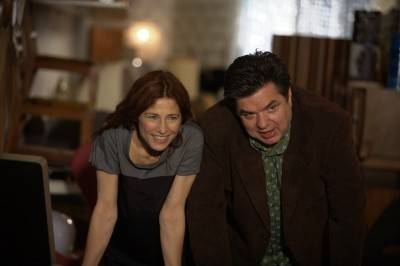Nicole Holofcener’s Please Give is one of those movies that makes me wish I lived in New York City. Surely if I moved there, I would meet people like the characters in this film, and we’d dazzle each other with well-timed quips and witty, urbane conversation? However, I have had a sneaking suspicion, ever since I first watched a Woody Allen movie, that real New Yorkers might fall slightly short of such expectations. No matter, this film makes up for that potential disappointment.
Please Give is full of droll dialogue, and the characters are developed well enough that it doesn’t matter that all they are really doing is talking. I confess I’ve had a bit of a girl-crush on Catherine Keener since Being John Malkovich, and she does not let me down in her role as Kate here, either. Kate and her husband Alex (Oliver Pratt) own a vintage furniture store, which sounds innocent enough, but acquiring the pieces they sell requires that they buy them, as Alex puts it, “from the children of dead people.” This fact creates a lot of upper-middle-class guilt for Kate, which she tries to alleviate in various ways, such as handing over wads of cash to homeless folk and refusing to buy expensive jeans for her unfortunately zitty teen daughter, Abby (Sarah Steele). Keener plays Kate’s angst to perfection, holding up a sympathetic but slightly uncomfortable mirror to the those who make their money in slightly dubious ways. Which, let’s face it, is most of us.
Holofcener previously delved into the ways in which money, ethics and relationships intersect in her 2006 film Friends with Money, also starring Catherine Keener. She explores those general themes again in Please Give, but here the emphasis in squarely on the currency of relationships, with material concerns playing a secondary role. As the title of the movie suggests, we all want certain things from the people in our lives, but unfortunately others are often unwilling or unable to give us those things, mostly because they are too busy struggling with their own issues.
The ensemble cast play their parts with a razor-sharp insight, allowing the audience to confront the seemingly insignificant yet oddly tragic aspects of personal relationships and the modern human condition. During a dinner party scene, all of the characters assemble to “celebrate” the birthday of Kate and Alex’s mildly horrible elderly next-door neighbour, Andra (Ann Guilbert). Andra is accompanied by her two adult granddaughters, the self-sacrificing Rebecca (Rebecca Hall) and tan-obsessed Mary (Amanda Peet). The scene is played for maximum awkwardness – it’s an open secret that Kate and Alex plan to knock down the wall between their apartment and Andra’s, once Andra kicks the bucket.
It’s at this dinner party Holofcener’s satire is at its most pointed. Abby shows up at the dining table wearing a pair of underwear on her head in order to hide a giant pimple on her nose, and we’re taken back to the self-consciousness of adolescence. Mary drunkenly insists on discussing Kate and Alex’s remodelling plans right in front of her might-as-well-already-be-dead grandmother, forcing the couple to play by adult social rules and indulge her, despite how inappropriate the conversation happens to be. Indeed, in this moment, we are suddenly all too aware that the old lady is really old and that most of us are going to get frail and annoying and possibly die in a chair one day, and likely someone like Kate will try to sell that very chair (well, if it’s an Eames and not an IKEA knockoff) Â to some yuppie for an outrageous amount of cash, but aren’t some things better left unsaid?
Apparently not in Holofcener’s New York, where people get to say what they want, most of the time. In fact, NYC is one of the main characters in this film – a presence/place that imposes urban decay, existential angst, and ethical quandaries upon the other characters, but also offers them the chance to speak their minds without the fear of social banishment, as might happen in a smaller city or town.
In the end, we are all left to figure out this being human thing on our own. Holofcener’s deceptively simple and amusing tale forces us to look at that fact, simply because the character’s needs and flaws are exposed over and over with such unflinching honesty.




